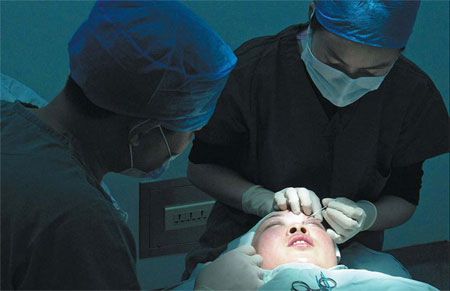Hooked on the scalpel
Updated: 2013-08-30 10:02
By Liu Zhihua (China Daily)
|
||||||||
|
The public has not seen the face of the woman who is perhaps China's most famous cosmetic surgery recipient. That is because the woman, who uses the pseudonym Pink Baby, wears a surgical mask when she appears on TV - not only to protect her identity but also because she says she has been disfigured by more than 200 plastic-surgery operations since she was 16. |
Addiction to Cosmetic procedures stems from deeper psychological issues, experts say
When most people think of addiction, they think of substance abuse, not plastic surgery.
But a growing number of Chinese are discovering cosmetic procedures' potential to become habit-forming as more people in the country have their appearances altered by surgery.
Experts agree cosmetic surgery addiction is unhealthy but struggle to define it. It's not an officially recognized mental illness, although likely stems from diagnosable disorders, such as obsessive compulsive disorder, body dysmorphic disorder and depression.
People obsessed with changing their appearances, no matter how strongly it distresses them, should seek professional help, Beijing Huilongguan Hospital psychiatrist Li Binbin says.
The director of Beijing Tongren Hospital Plastic Surgery and Beauty Center, Zheng Yongsheng, says cosmetic procedures are more psychological than physical.
"They change self-perceived physical defects, sometimes that is potentially addictive, especially to people who are never satisfied with their looks," Zheng says.
He has met many patients who want to change their lives by changing their appearance. Many get confidence boosts after operations and return for more.
Huang Wei, who covered the industry as a journalist in Fujian province before co-founding a private clinic in Beijing, agrees it is about confidence.
But Li, the psychiatrist, says there is more to it. The source is usually deeper underlying psychological issues.
"As with any obsessive or addictive behavior, cosmetic surgery addiction stems from distorted reasoning and perceptions of relationships," Li says.
Many patients in mental health facilities experience an intense preoccupation with imagined defects in their appearances, he says. They often blame career and relationship failures on these perceived physical flaws.
Virtually everyone wants to be good-looking. But most do not let it rule their lives, especially if they have various sources from which to draw confidence and security, he says.
The problems often stem from personality and childhood experiences, he says.
People with low self-esteem and feelings of insecurity are more likely to entertain obsessive thoughts and behaviors. That includes cosmetic surgery addicts, Li says.
People who fail to acquire the ability to accept the fact that loss is a part of life as children are less likely to deal with loss maturely as they age. They're likely to seek repeated cosmetic procedures to attempt to preserve youth, he says.
Body dysmorphic disorder is a subtype of hypochondriasis, or health anxiety - a mental disorder characterized by an excessive preoccupation with, or anxiety about, serious illness based on misinterpretations of bodily symptoms.
BDD patients are concerned about minimal or imagined appearance flaws, and feel insecure and unhappy.
Some resort to cosmetic procedures but cannot find satisfaction in them, Li says.
BDD often exists alongside other mental disorders, including obsessive compulsive disorder, depression and anxiety.
"That's not to say everyone who gets multiple plastic surgeries are addicts or have BDD," Li explains.
"But there's a likelihood they're not psychologically healthy."
Family and friends should be concerned if a person feels unhappy if they do not receive cosmetic surgery and or regrets having them but can't resist the temptation to get more.
Another red flag is impaired social functioning, such as an inability to work or self-imposed isolation, resulting from preoccupations with cosmetic procedures.
"Family and friends should form a support network to help rid them of paranoid and obsessive thoughts and behaviors related with cosmetic procedures," Li says.
"The best thing they can do is persuade the person to seek professional help."
liuzhihua@chinadaily.com.cn

 'Despicable' minions upset Depp's 'Lone Ranger' at box office
'Despicable' minions upset Depp's 'Lone Ranger' at box office
 'Taken 2' grabs movie box office crown
'Taken 2' grabs movie box office crown
 Rihanna's 'Diamonds' tops UK pop chart
Rihanna's 'Diamonds' tops UK pop chart
 Fans get look at vintage Rolling Stones
Fans get look at vintage Rolling Stones
 Celebrities attend Power of Women event
Celebrities attend Power of Women event
 Ang Lee breaks 'every rule' to make unlikely new Life of Pi film
Ang Lee breaks 'every rule' to make unlikely new Life of Pi film
 Rihanna almost thrown out of nightclub
Rihanna almost thrown out of nightclub
 'Dark Knight' wins weekend box office
'Dark Knight' wins weekend box office
Most Viewed
Editor's Picks

|

|

|

|

|

|
Today's Top News
Chinese shifting attention to US stock markets
Washington State governor plans Chinese mission
US readies possible solo action against Syria
Fed's taper is a key issue for G20
Visa issues resolved in new policy
Xiaomi hires Google exec
Trending news across China
Solar panel maker hits milestone
US Weekly

|

|







